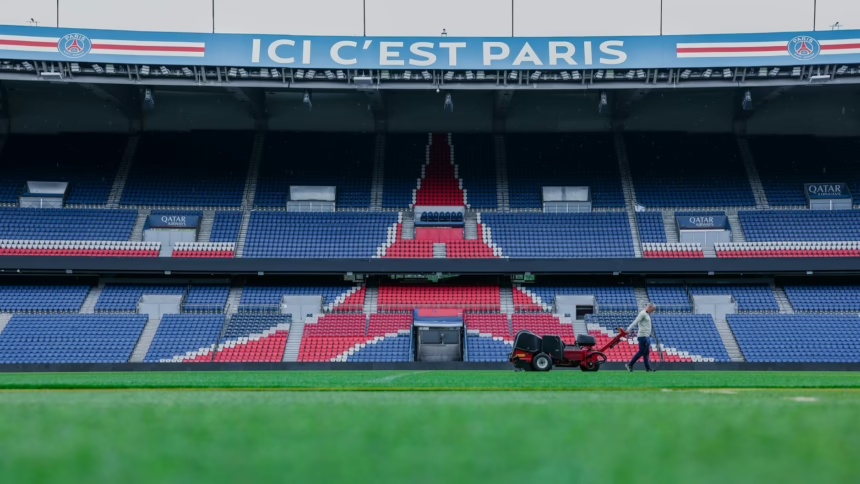Hamstring Setback Fuels Club’s Frustration with National Team Management
The vibrant atmosphere surrounding Paris Saint-Germain has been dimmed by a significant injury to star winger Ousmane Dembele, a setback that has reportedly ignited a furious response from the club’s hierarchy. The incident, which occurred during France’s recent 2-0 victory, has thrust a familiar tension between club and country football into the spotlight, raising questions about player welfare and the demanding international schedule.
Dembele’s Injury: A Blow to PSG’s Ambitions
According to reports from the Mail Online, PSG are “left FURIOUS” with France boss Didier Deschamps following the news that Ousmane Dembele is expected to be “ruled out of action for six weeks” with a “serious” hamstring injury. The 26-year-old French international, a key player for both club and country, sustained the injury during Friday’s match. This extended absence is a substantial blow to PSG’s domestic and European campaigns, where Dembele has been a vital attacking outlet and a significant part of their tactical setup.
The Delicate Balancing Act: Club vs. Country Demands
This situation underscores the perennial conflict between the financial and sporting interests of elite football clubs and the demands of national team management. Clubs invest heavily in acquiring and developing top talent, expecting these players to be available for crucial domestic league fixtures, cup competitions, and the prestigious UEFA Champions League. However, international breaks require players to travel, often long distances, to represent their countries in qualifiers, friendlies, and major tournaments. While international success is a source of national pride, the inherent risks of injury during these periods are a constant concern for club managers and boards.
The report from Mail Online suggests that PSG’s frustration stems from a perceived lack of caution or consideration for Dembele’s fitness by the French national team staff. While Deschamps is lauded for his success with France, managing a squad of world-class athletes through rigorous international duty inevitably carries risks. The exact circumstances leading to Dembele’s injury are still being assessed, but the fact that a key player for a top European club has suffered a significant layoff while on international duty will undoubtedly fuel further debate about the scheduling and management of players during these crucial windows.
Disputed Severity and Potential for Precedent
The extent of Dembele’s injury is reportedly “serious,” with the six-week layoff painting a grim picture for PSG’s immediate future. While the Mail Online article attributes this timeline and the club’s reaction, the precise medical details and the official duration of his absence will likely be confirmed by PSG’s medical team in due course. The club’s “fury,” as described, suggests a belief that the injury might have been preventable or exacerbated by specific circumstances during the international period.
This incident could set a precedent for future negotiations and discussions between clubs and national federations. When a club’s star player suffers a significant injury while on international duty, particularly if there are questions about the circumstances, it can lead to heightened scrutiny of player management and a demand for greater transparency and cooperation. The physical toll on players who participate in both demanding club schedules and international commitments is immense, and injuries like Dembele’s serve as a stark reminder of the pressures these athletes face.
Navigating the Fallout: What’s Next for PSG and France?
For Paris Saint-Germain, the immediate challenge is to adapt to life without Dembele. His pace, dribbling ability, and creative spark are difficult to replace, and his absence will test the depth and resilience of the squad. Manager Luis Enrique will need to find alternative solutions to maintain PSG’s attacking threat and secure vital points in upcoming matches. This could involve a reshuffling of attacking personnel or a tactical adjustment to compensate for Dembele’s unique skill set.
On the international front, Didier Deschamps will also need to consider the implications of losing a key player for future French fixtures. The manager’s ability to manage his squad effectively and secure positive results will be closely watched, especially if similar injury concerns arise for other players in the future.
Player Welfare in the Modern Game: A Pressing Concern
The injury to Ousmane Dembele serves as a critical reminder of the increasing demands placed upon modern footballers. The global football calendar is packed with club competitions, domestic cups, continental championships, and international qualifiers. While the sport’s popularity and commercial success are undeniable, the welfare of the players at its heart must remain a paramount concern. Clubs like PSG, investing millions in their squads, have a legitimate interest in protecting their assets. The tension highlighted by this incident is a complex issue with no easy solutions, but it demands ongoing dialogue and a commitment to finding a more sustainable balance between the commitments of club and country football.
Key Takeaways:
- Paris Saint-Germain is reportedly furious with France manager Didier Deschamps following Ousmane Dembele’s “serious” hamstring injury.
- Dembele is expected to be sidelined for approximately six weeks, impacting PSG’s immediate fixtures.
- The incident reignites the long-standing tension between club and country football regarding player welfare and scheduling.
- Clubs invest significantly in players and are understandably concerned about injuries sustained during international breaks.
- PSG must now adapt their tactics and personnel to cope with Dembele’s absence.
- The situation raises broader questions about player burnout and the sustainability of the modern football calendar.
As the football world navigates this latest setback, the focus will undoubtedly remain on Ousmane Dembele’s recovery and the ongoing dialogue between clubs and national federations to ensure player well-being is prioritized in the demanding landscape of professional football.


